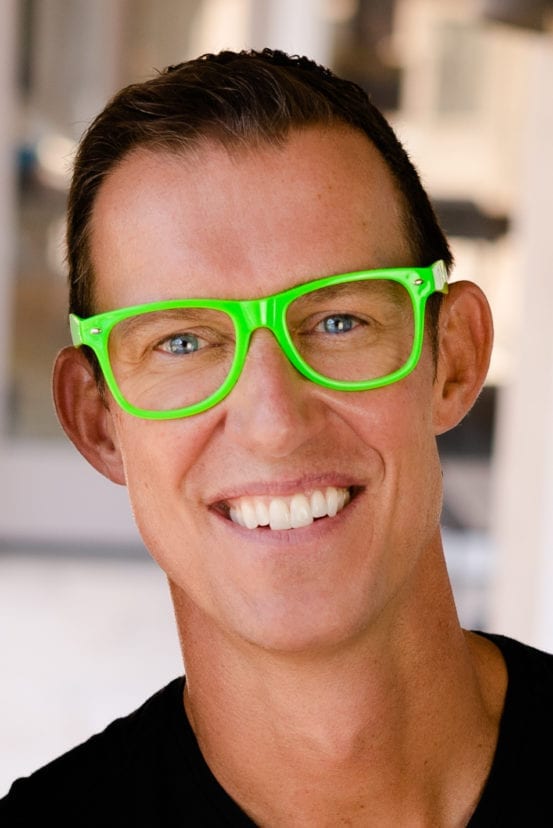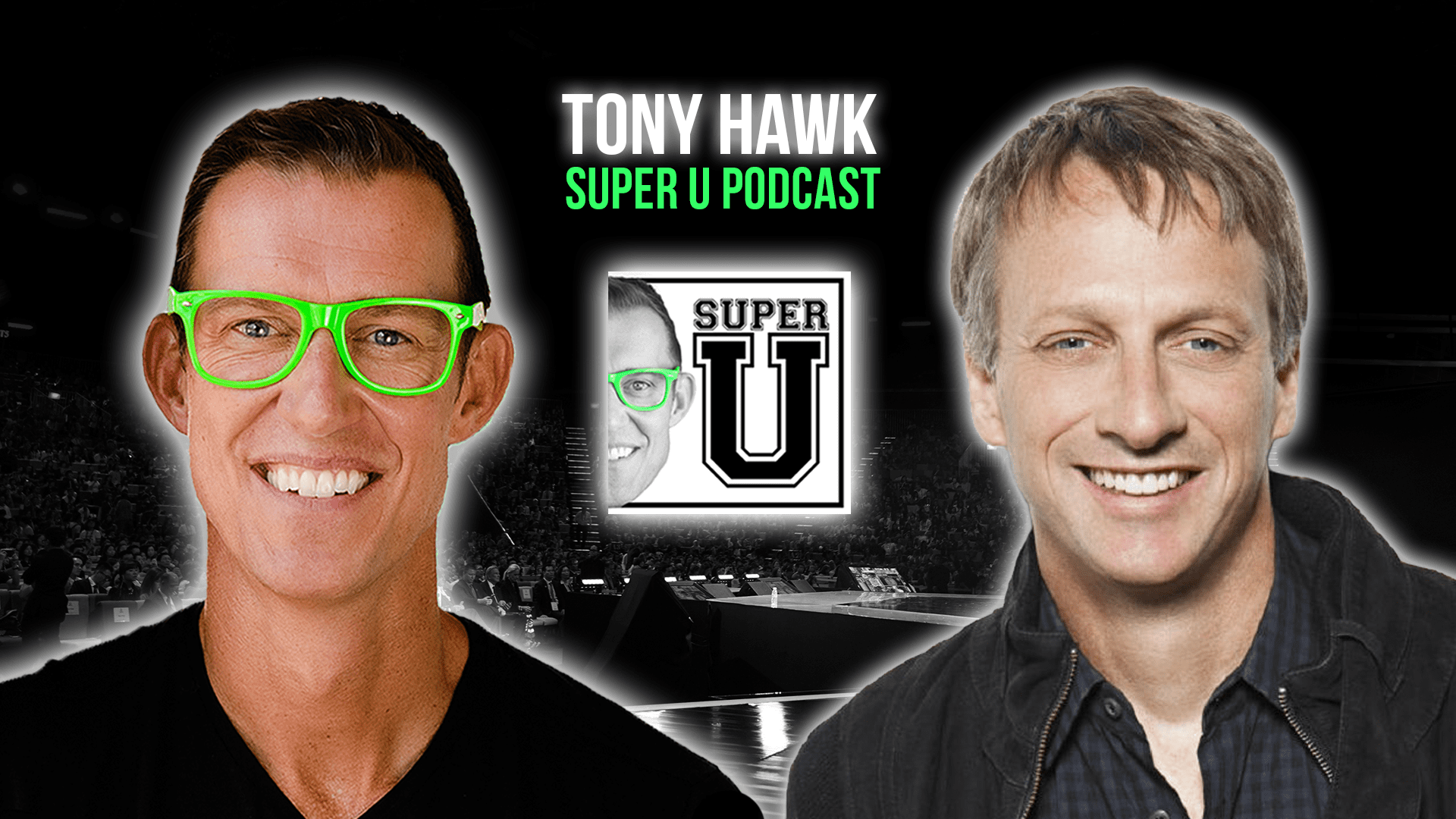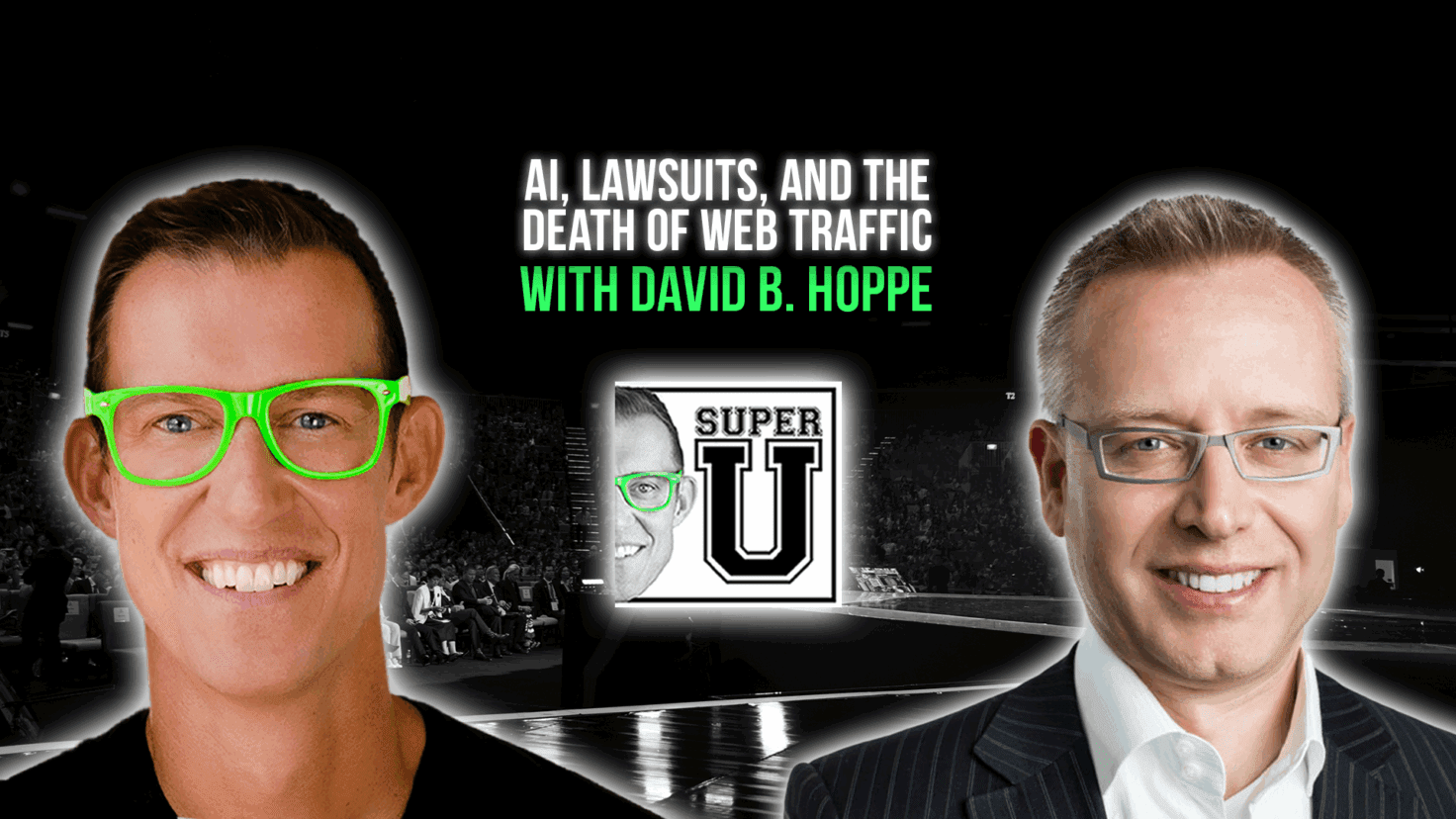Super U Podcast | 7 Super Tips with Tony Hawk
The world knows Tony Hawk as a legendary skateboarder, entrepreneur, and founder of The Skatepark Project. By 14 he turned pro, and by 16 was considered the best competitive skateboarder on earth. In 1999, Tony teamed up with Activision to create the Tony Hawk’s™ Pro Skater™ video game. He became the first skateboarder to ever land a 900, which was considered the holy grail of vert skateboarding at the time. Today, his business skills have helped create a Tony Hawk brand that includes a billion-dollar video game franchise, with a remastered Tony Hawk’s™ Pro Skater™ 1+2 game released in 2020 to rave reviews. Also in his portfolio are Hawk Clothing apparel company, Birdhouse Skateboards and the Tony Hawk Signature Series sporting goods and toys. His speaking engagements draw huge crowds, inspiring everyone from media savvy millennials to corporate veterans. An intuitive marketer with a knack for social networking, Tony’s fans number in the millions on Facebook, Twitter, Instagram, and TikTok.
5x #1 Bestselling Author and Motivational Speaker Erik Qualman has performed in over 55 countries and reached over 50 million people this past decade. He was voted the 2nd Most Likable Author in the World behind Harry Potter’s J.K. Rowling. Qualman is also the inventor of the bestselling board game Kittycorn.
Need a sneak peek? Below are the main takeaways from the episode.
Super U Podcast | 7 Super Tips with Tony Hawk
[4:17] Tip #1
“Being a Pro Skater was the equivalent of being a professional yo, yo player. And it wasn’t until I was 17 when I started actually making money, that, that it became more of an issue because they were still they were saying like you have to figure out what you can do with your life. You have to figure out your career. And I was like, I think I have a career. Yeah, making money and I own a house and I’m still in high school. That seems like a career to me. No, and they and they were saying well, most of it was just like it’s not gonna last but definitely in from the ages of say 17 to two When he won, and then after that, it started falling out. Yeah, it was definitely less and less popular each year.”
[5:23] Tip #2
“I was 24 with a child on the way to mortgages. And saying, I don’t know what I’m going to do. I don’t skateboard doesn’t seem like it’s lasting. And I took a chance and started my own skateboard company at the time, which seemed like the most ridiculous idea, but it just showed how devoted I was to the sport. Like I love skateboarding so much that I was willing to risk everything, just to be in control of a skate brand. Because I thought my career as a skater was over. You know, like, in those days, if you’re in your 20s, that’s, that was the top end of the age limit of what people thought you could be relevant. And so I said, Okay, I’m going to start a company and start my own team and be able to guide them. Through my experience.”
[6:21] Tip #3
“I’d say through the 2000s, when things were crazy, and there was, you know, suddenly, it was like, Wait, you’re a celebrity for skateboarding. I thought I had to fit that role. And I kind of chased it for a while it was like, Oh, you can read carpet, and you get to this, and this event, you got to go to, you know, go to this charity event, and Con and it was like, and I did it for a while. And I was like, I don’t want to hang out with these people. Somebody like just because they’re famous doesn’t make them fun or cool. Like, and they’re you it was, it was kind of a, I came to a realization, maybe a little too late, like at the cost of going and, you know, not spending time with my kids. And, you know, just kind of suddenly I thought, Oh, this is where I am, this is what I’m supposed to do at this level. And, and it sucks, like it was, you know, it’s not that I have regret I learned a lot from and I’m glad I came to fire and came back to doing what I love. But for sure there was a moment there where I was caught in the hype and, and thought that that’s this is my life now.”
[7:35] Tip #4
“Really notice it in my peers, because my peers were the ones my contemporaries at the time in the 80s. They were all really good as far as I could tell you not to me, and I didn’t think Oh, this guy’s not utilizing his talents enough for this guy’s not motivated enough, we were all sort of coming up together. It wasn’t until I started my own team that I realized that there are people with incredible talent and no motivation. And then there are other people that are willing to work their asses off, who don’t have a natural ability but will become successful because they’re so determined. And I saw it. I mean, I saw it, especially in a couple of guys that I first put on the birdhouse team.”
[8:41] Tip #5
“We know that we’ve empowered someone else to do a lot of the groundwork. So we don’t like taking credit for that. And I think that’s amazing. Our model of how we do skate parks, is is is that where we’re not just going alright, here’s a small town like Fargo, North Dakota, they need a skatepark. We’re going to come in and build a skatepark and we get the glory. We want to we want the communities to have a sense of pride and ownership in the project that they helped to create. Yes, they were having fundraisers for they were petitioning for and going to city council meetings. We just you know, we just give them the tools to make that happen.”
[9:37] Tip #6
“I’m willing to struggle through the learning process and even change what I’m my approach to doing something just to figure out how to do it. And so I guess I just never I’d never wanted to back down from a challenge even one I just posed for myself. I think that the kiss of death is if you’re convinced that you’re going to fail or fall or get hurt. That will come to fruition because that’s what you’re visualizing. I never visually, you know, I was willing to get hurt along the way. But I didn’t visualize myself getting hurt along the way. And I think that’s what, that’s what stops a lot of people. And that’s really what separates a lot of people from being World Champions or from being as good as they can, because they stop at some point saying, Oh, no, I, I am not capable of this, or I’ll probably get hurt doing this. And if you approach anything with that hesitation, you’re going to fail. I always approached it like, this is going to work, I’m going to figure this out. Even if it takes me hundreds of attempts.”
[11:06] Tip #7
“Especially in the case of there’s a skate park in Uganda, where these guys went there. They were doing some charity work and they had skateboards, and some of the people the villagers there were took interest in it. So they built them this concrete Park, it’s amazing. It looks like it’s made out of clay. And the type of skating the guy the people are doing from Uganda in this park is not influenced by the magazines or from the videos or anything like that. So they’ve almost created their own style. And some of the things we’re doing are really fun and interesting to me, they would be, you know, considered more novelty to us, perhaps, but they’ve taken it to new levels and doing these tricks, you know, doing these sort of early grab tricks, or flips and types of stuff like that, that, that we wouldn’t really consider doing, because it’s not what’s considered cool now. And so that, to me, is really exciting. You know, as different as it is. And I think it shows that you can have these pockets of interest and passion and create your own style of doing it. I mean, that’s absolute we were doing in the 80s because we didn’t have those influences, we didn’t have YouTube. We didn’t you know, we were barely getting skate magazines. So we’re just making up as we went.”
Connect with Tony Hawk:
Instagram: @TonyHawk
Twitter: @TonyHawk
Youtube: https://www.youtube.com/user/tonyhawk
Click here to subscribe and listen to the full episode.

To ensure you don’t miss future episodes, subscribe to our podcast by clicking here >> Super U Podcast. We hope these tips help unlock and unleash your inner superpower!
The Super U Podcast is hosted by #1 bestselling author and Motivational Speaker Erik Qualman.





